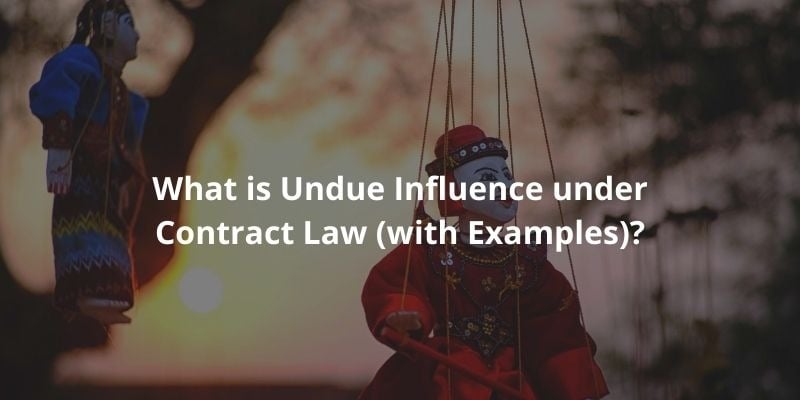What is Undue Influence under Contract Law (with Examples)?
7 Dec 2023
22 Jan 2021
min read

Undue influence is an equitable doctrine in contract law that refers to circumstances in which an individual with more power places improper pressure on the weaker party to induce them into entering a contract against their will. If undue influence is found, this will invalidate the contract, which helps protect freedom of contract. Undue influence is one of the biggest risks during contract formation and negotiation, yet few know what undue influence is, or how to identify it.
This article will provide an overview of undue influence in a contract, bars to the remedy of recission, and how to identify it and take steps to avoid it when you negotiate your next contract.

What is undue influence?
Undue influence occurs when a person abuses a position of ‘trust and confidence to pressure another party to enter a legally binding contract against their will.
A finding of undue influence requires that there is a relationship where one party is dependent on the other. The person who is depended on must occupy a position of ‘trust and confidence. For undue influence to happen, this position will be abused, resulting in the dependent party being pressured to enter a legally binding contract and subsequently put at a disadvantage.
There are two situations where undue influence may arise:
Special Relationship
Where there is a special relationship between the parties, there is a presumption that the transaction results from undue influence, and the burden of proof is on the person receiving the benefit to rebut the presumption. An important way to rebut undue influence presumes to show that independent advice was taken by the other party out of their own free will.
No Special Relationship
Where no special relationship exists between the parties, the party claiming undue influence has the burden of proving actual undue influence (see below).
There is no fixed list of relationships where undue influence might occur. A finding of undue influence can occur in any relationship, so long as the key legal requirements are present.
When might undue influence occur?
Undue influence can be exercised to induce the giving of a gift to another. For instance, party A may, through the exercise of undue influence, induce party B to give a gift to party C. Likewise, undue influence can be exercised to induce another party to enter a contract.
Undue influence applies where the person who has allegedly exercised the influence induces another party to enter a contract with himself. For instance, Party A may, through the exercise of undue influence, induce Party B to enter a contract with Party A himself.
Undue influence can also work to induce a person to enter a contract with someone other than the purported influencer. For instance, Party A can, through the exercise of undue influence, induce Party B to enter a contract with Party C.
Where is undue influence particularly prevalent?
Undue influence is particularly prevalent in the financial sector.
Specifically, it is most common when it comes to mortgages and guarantees. The most common scenario is one where one party, traditionally the husband, influences his wife to enter a guarantee for a loan or mortgage on a home to support his business. The husband then defaults on loan repayments, which results in the wife claiming that the agreement should be rescinded for undue influence.

What are the different types of undue influence?
There are three types of undue influence as recognised in most common law countries:
1. Actual undue influence
2. Presumed undue influence where the presumption is rebuttable
3. Presumed undue influence where the presumption is irrebuttable
We will go into more detail below.
Actual Undue Influence
Actual undue influence refers to cases where the undue influence is obvious and is easy to prove. The purported influencer must fulfil certain criteria:
1. The influencer had the capacity to influence the victim
2. The influencer did in fact influence the victim, and the influence was ‘undue’
3. The influence did in fact induce the transaction
An example of actual undue influence includes one party threatening to end a relationship with the other unless they enter a specified contract. Another example may include one party constantly pestering and threatening to only stop if the other enters a specific transaction.
Presumed undue influence where the presumption is rebuttable
If the criteria for actual undue influence cannot be proven, the victim may be able to establish a presumption of undue influence. This category varies from actual undue influence in that the victim can just prove that a certain set of circumstances exist, from where undue influence will be inferred. Under this category, a purported victim must prove that the following circumstances exist:
1. The purported victim placed trust and confidence in the other party
2. The transaction entered calls for an explanation
Under the first requirement, that the purported victim must place trust and confidence in the other party; there are many types of relationships have been held to fall into this category:
1. Husband and Wife
Husband and wife relationships have been treated as one where trust and confidence have been placed by one in the other party. This may still vary from relationship to relationship.
2. Bank and Customer
Relationships between the bank and customers are considered relationships of trust and confidence.
3. Cohabitees (excluding husband and wife)
Cohabitees in an emotional relationship of some sort with one another have been treated as being in a relationship of trust and confidence. This is the case regardless of marital status.
4. Commanding officer and soldier in the army
Relationships between a soldier and an army officer are treated as relationships of trust and confidence.

Going back to the second requirement, that the transaction entered calls for an explanation - this means that the transaction must appear questionable to the average onlooker, warranting an explanation.
If both requirements are fully proven, to the satisfaction of the courts, it will be presumed that the transaction has been procured by undue influence.
At this stage, the purported influencer will have the opportunity to raise a counterclaim to prove that the transaction was not procured by undue influence. The purported influencer may be able to do this by rebutting the purported victim’s claim of undue influence by proving that there was no relationship of trust and confidence between them. However, if no explanation is provided by the purported influencer to the satisfaction of the courts, then it will continue to be deemed a transaction procured by undue influence.
What constitutes a satisfactory explanation of the transaction will depend on the specific circumstances. Generally, however, the more lop-sided or unequal the transaction, the better the explanation must be before the presumption can be rebutted successfully.
Presumed undue influence with an irrebuttable presumption
Certain relationships are recognised in law as being ‘special’. These relationships are special in the sense that within these relationships, one person having influence over another is common and to be expected.
Thus, unlike the second category, there is no need to prove that a relationship of trust and confidence exists – it is presumed once a particular type of relationship is found to exist. The purported victim will just need to prove that the influence was undue or calls for an explanation.
Examples of the types of relationships that qualify for this presumption of influence include the following:
1. Parent/child
2. Trustee/beneficiary
3. Solicitor/client
4. Medical adviser/patient
Note that a husband-and-wife relationship does not fall on this list.

Three party cases
Undue influence by a third party can give rise to a claim for undue influence. If successful, the contract between the purported victim and the other will be voidable.
For the contract to be voidable, however, the other party to the contract should be ‘put on inquiry’, which means that the business (the ‘third party’) is under a duty to take reasonable care to protect the victim against undue influence. To fulfil this duty to take reasonable care, they should host a private meeting, away from the suspected influencer. In this meeting, the extent of liability and the risks involved in acting as a guarantee or mortgagor should be touched upon. The purported victim should also be urged to take separate legal advice if possible.
To ensure they will be able to rely on the contract at issue, the business should obtain assurance from the solicitor they have been duly advised in a legal capacity.
When a business is considered to have been ‘put on inquiry’ will depend on the facts of the situation at hand. For banks, however, there is clearer guidance. It will be ‘put on inquiry’ whenever a relationship between guarantor and borrower is non-commercial. If put on inquiry, it has a duty to take reasonable care to protect the person they are contracting with from any undue influence.
How to show that there was no undue influence? How can I protect myself from undue influence?
Now that you better understand undue influence, you need to know how to proactively avoid transactions marred by undue influence. This might involve taking steps to protect yourself
the next time you get the slightest hint that there might be an undue influence at play.
Once a presumption of undue influence is established by a purported victim, the accused may rebut the presumption of undue influence by proving that the claimant entered the contract freely, out of their own volition.
One of the main ways to prove that a person has agreed freely is by showing that the purported victim got independent advice regarding the transaction in which undue influence is claimed. Usually, the adviser will be a solicitor. This solicitor must be a person who does not have any relationship with the purported influencer.
What happens to a contract if it is found to have been procured by undue influence?
If a contract is found to have been procured by undue influence, the innocent party will be entitled to the remedy of rescission.
Rescission is where a contract is set aside, and the parties are put back into the position in which they were before the contract was made.
Rescission is different from the termination of a contract. Termination operates prospectively, meaning that when a contract is terminated, the future obligations owed by either party fall away. The contract is brought to an end from the point of termination onwards – so, neither party has to perform any obligations which fall due after the date of termination.
In the case of rescission, it operates both prospectively and retrospectively. It operates prospectively because the parties are not required to perform any obligations as they fall due from the date of recission. It also operates retrospectively the contract is unwinded, where parties are put in the position, they would have been in had the contract not been entered into in the first place.
A finding of undue influence will give the innocent party the right to rescind the contract.
What are the limitations to recission?
The innocent party’s right to rescind is subject to certain ‘bars to rescission’, which include the following:
1. Affirmation
Where the victim elects to continue with the agreement despite the undue influence
2. Impossibility of restoring the parties
If it is not possible to put the parties into the position they would have been in if the contract was not entered into in the first place, then, restitution will not be possible. This is usually not an issue for parties, because the courts can usually come up with a money equivalent even if there is no precise restitution
3. Delay
A party who is subject to undue influence will be expected to seek relief within a reasonable period following the end of the undue influence. If this is not done, the right to rescind may be lost.
Please note that this is a general summary of the position under common law and does not constitute legal advice. As the laws of each jurisdiction may be different, you may wish to consult your lawyer.
Keywords:

